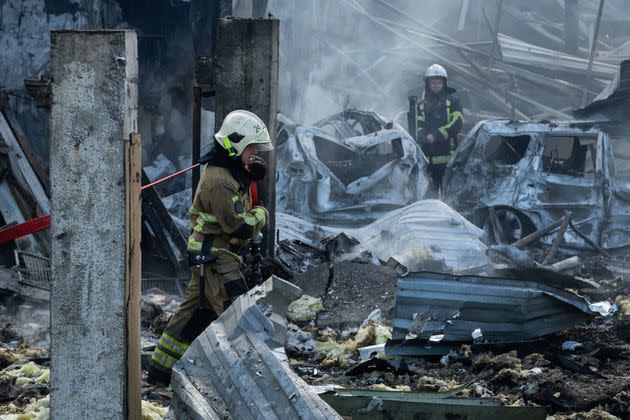UK Speculates Why Russia Hasn't Conducted A Strike Against Ukraine In 3 Weeks

A Firefighter walks amid rubble at an industrial area after missile attack on September 21, 2023 in Kyiv, Ukraine
UK intelligence has a theory to explain why Russia has not launched a strike against Ukraine in 21 days.
In its latest update released on Friday, the ministry of defence (MoD) noted that the last strike conducted by the Russian Air Force Long Range Aviation (LRA) was carried out on September 21.
The MoD pointed out that these kind of gaps between air attacks have not been entirely “unusual” over the course of the war – but that Moscow has actually been consistently striking Ukraine for the last six months.
The last time Russia had a long break like this was the 51-day pause recorded between March 9 and April 28 earlier this year, according to the MoD.
The UK intelligence officers claimed: “In that instance, it was likely that LRA had almost depleted its stocks of capable AS-23 missile munitions following its winter campaign against Ukrainian critical national infrastructure.”
Russia is “likely” trying to preserve its stocks of these missiles, and using this break to “increase useable stocks in anticipation of further heavy strikes against Ukraine over the winter”.
As temperatures drop, the frontline in Ukraine is likely to become even more static, meaning both sides will turn to other means of attack across the winter.
The MoD also noted that Russia has been focusing its airstrikes against grain-related facilities in the south of Ukraine recently, and probably using highly accurate, un-crewed aerial vehicles for these attacks.
It comes after Moscow refused to renew the deal which allowed Ukraine to export its grain through the wartime blockade, meaning Russia is now targeting Kyiv’s other export routes along the River Danube.
Russian president Vladimir Putin has refused to restart the landmark deal until he gets compromises from the West.
The MoD speculated in July that Russia actually wanted to leave the Black Sea Grain Initiative “because it decided that the deal was no longer serving its interests”.
“Russia has masked this with disinformation,” the UK intelligence suggested, “claiming its withdrawal is instead due to concerns that civilians ships are at risk from Ukrainian mines and that Ukraine was making military use of the grain corridor without providing evidence for these claims.”
The Ukrainian authorities claim more than 270,000 tonnes of grain have been destroyed by the Russian attacks on the river ports in recent months.
Latest Defence Intelligence update on the situation in Ukraine – 13 October 2023.
Find out more about Defence Intelligence's use of language: https://t.co/TXhIOLOq0d
🇺🇦 #StandWithUkraine 🇺🇦 pic.twitter.com/6N5MIzwwEp— Ministry of Defence 🇬🇧 (@DefenceHQ) October 13, 2023

 Yahoo Finance
Yahoo Finance 